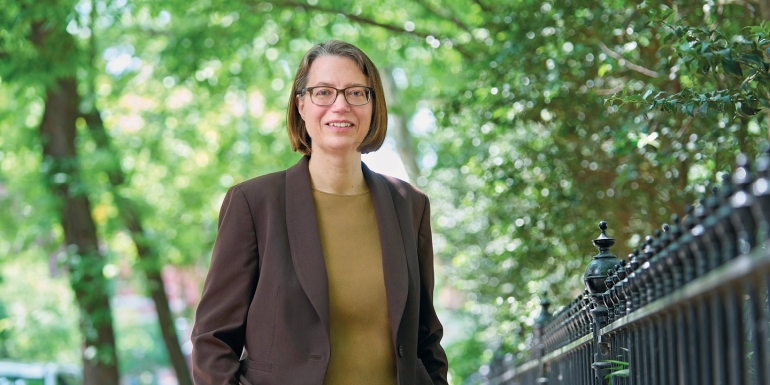Family Defense Clinic helps end agency surveillance of parents not charged with wrongdoing

A new appellate ruling in state court in New York curtails the state’s surveillance of families, in a victory for a client represented by the NYU Law Family Defense Clinic. An appeal filed on behalf of Sharneka W. successfully challenged a longstanding practice by New York City’s Administration for Children’s Services (ACS): routinely obtaining supervision orders over parents who had done nothing wrong in cases when the other parent was charged with wrongdoing. These orders have allowed ACS to conduct repeated, unannounced searches of homes and even strip-searches of children.
The clinic, taught by Professor Chris Gottlieb ’97, was co-counsel for Sharneka W. alongside the Family Justice Law Center, which is headed by David Shalleck-Klein ’16, with pro bono assistance from the law firm Orrick, Herrington & Sutcliffe. “Because of Ms. W.’s bravery and determination, [the] decision transforms the way ACS surveils thousands of families every year. ACS’s widespread practice was paternalistic, patronizing, and patently illegal,” said Shalleck-Klein in a statement. “Today’s decision makes clear that ACS is not above the law.”
For the Family Defense Clinic, the win represents the culmination of a strategic three-year effort to end ACS’s use of supervision orders against parents who aren’t accused of any offense. It’s also part of a broader effort to create new precedent in family defense law in response to community concerns, says Gottlieb. “We’re really looking to develop cases so that we can address important issues in the field,” she says.
Directly impacted families, including domestic violence survivors—who often face such supervision orders—first flagged the harms that ACS surveillance causes to parents and children, Gottlieb says. After hearing these concerns, the clinic worked with the Family Justice Law Center to develop statutory and constitutional arguments against the ACS practice. They then conducted trainings for family law attorneys throughout New York City, focusing on how to identify cases that could be used to challenge ACS surveillance and how to preserve the record for appeal in such cases.
As a result of the training, two lawyers brought Sharneka W.’s case to the clinic. After experiencing domestic violence from the father of her one-year-old child, Sharneka W. had barred him from the home. ACS took the matter to family court because the violence had occurred when the child was present, and the father was charged with neglect. Although Sharneka W. faced no accusation of wrongdoing, ACS obtained a supervision order that required her to give the agency access to her home in order to keep custody of her child. Represented by Family Justice Law Center and the Family Defense Clinic, she appealed the order.
On February 5, a four-judge panel in New York State Supreme Court Appellate Division, Second Department ruled unanimously that the family court did not have authority to place Sharneka W. under the supervision of ACS and the court. Observing that the issue is one of “substantial…statewide importance,” the appellate court found that ACS surveillance of parents who are not accused of wrongdoing “constitute[s] precisely the type of state intervention that the Legislature sought to avoid in circumstances when it is not warranted.” Such surveillance can be “traumatic for both the child and the parent,” the court wrote.
“For too long, Children’s Services has violated families’ rights in the name of protecting children when its illegal surveillance and home intrusions are actually quite harmful to the children the city is supposed to serve,” Gottlieb said in a statement. “We do not allow routine violations of the constitutional rights of families who live in more privileged neighborhoods, and we should not have a different system of justice for the low-income families of color who are policed by ACS.”
“As a survivor of domestic violence, I thought I would be supported and heard. Instead, the family court subjected me and my baby to months of traumatic ACS surveillance,” said Sharneka W. in a statement. “I’m so glad that other families won’t have to go through what my family did.”
Posted February 14, 2025

